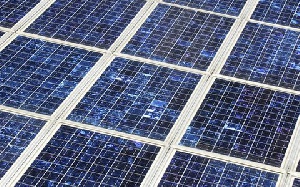Solar energy alone can take care of Ghana’s modest ambition of achieving 10% renewable energy penetration in its energy mix by 2020, Randy Sey, Managing Director of Tradeworks Company Ltd, a distributor and installer of solar energy systems has said, calling for a more aggressive approach.
“If you look at the investments other countries are making into solar energy because of its sustainability, and if you look at the abundant sunlight that we have in Ghana, there is no reason we shouldn’t challenge ourselves to say that 20% to 30% of our power should come from renewable energy,” Randy Sey told the B&FT in an interview.
“In the past, people have seen solar as only suitable for use in the rural areas, in areas that are not connected to the national grid, and areas that are far away. But that is not the case, solar can be used anywhere.
“In fact, in Germany, most of the solar systems are installed in urban areas. Ordinary citizens, ordinary homes, make the majority of installations. And the reason is solar gives you independence and contributes to national energy security because the whole population is not tied up to one source of power.”
Ghana’s Renewable Energy Act, passed in 2011, is the country’s response to a global movement away from traditional sources of power like coal and thermal plants to the use of the sun, wind and biofuels for power generation.
So far, Ghana has installed only two megawatts of solar power, at Navrongo in the Upper East Region, but a few individuals and organisations have installed solar panels to complement their power needs.
Although the Renewable Energy Act does not specify how much each of the three main renewable sources will contribute to the 10% target, solar is seen as the most plausible even though it is relatively expensive.
The good news, according to Randy Sey, is that “since 2004, the cost of solar systems has gone down by as much as 60%; and every day it is going down. This is because of the economies of scale that have been achieved through a rapid deployment of solar systems everywhere; it’s been commercialised and it’s been deployed in every country.”
He simplifies the matter even better: “Anybody who has bought a car, anybody who has built a house, anybody who has bought a piece of land -- and we all know these days you can buy a plot of land for GH¢2,000 -- can buy a solar system. The price is as low as GH¢1,500. Think of a solar system either as an air conditioner or as a car or as a generator. The bigger the solar system you buy, the larger the number of appliances that it can power.”
Heightened green politics globally has pushed the deployment of renewable energy to levels that are considered significant enough to mark another transition in how the world sources its ever-increasing energy needs.
While less than 50 countries worldwide had renewable support policies in place in the early part of the last decade, the number is said to have now reached over 120. Investments in renewables have also risen dramatically over the past decade.
The new Annual Renewable Energy Outlook 2013 analysis from Frost & Sullivan, the business consulting firm, finds that political and financial assistance has played a major role in taking renewable energy to the heights it has achieved. These factors will continue to influence the market, and the installed capacity of renewable sources will reach an estimated 2,252.3 gigawatts in 2020.
"The EU has set binding targets to source 20% of the bloc's total energy consumption from renewable energy sources in 2020, and targets for individual member-states range from 10% for Malta to 49% for Sweden," Frost & Sullivan Energy and Environmental Industry Director Harald Thaler is quoted as saying.
"Climate and energy policies as well as long-term price-based incentives, such as subsidies and tax benefits, can substantially boost renewable energy penetration and innovation." Ghana’s Renewable Energy Act provides for a feed-in-tariff scheme to guarantee the sale of electricity generated from renewable energy sources.
The Act further provides for the establishment of a Renewable Energy Fund, the object of which is “to provide financial resources for the promotion, development, sustainable management and utilisation of renewable energy sources.”
The fund is however yet to be set up.
Business News of Friday, 6 September 2013
Source: B&FT
Solar can do the trick - Randy Sey
Entertainment












